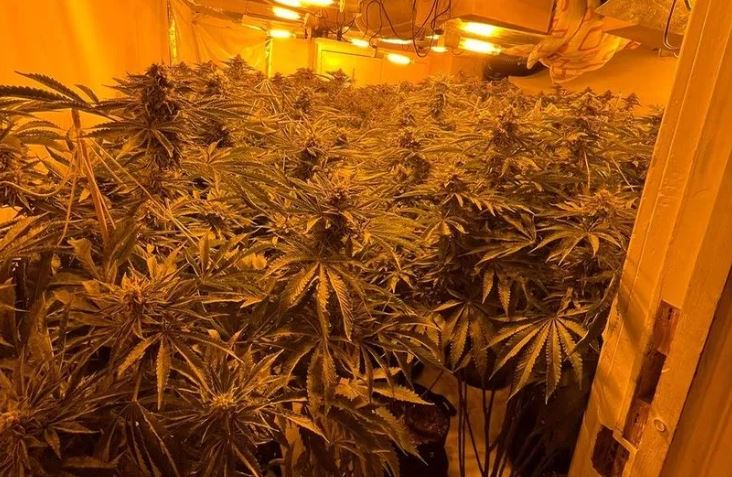Almost 4,000 cannabis plants seized across North Wales in June

At a scale and pace not seen before, police across England and Wales have coordinated a thousand search warrants against Organised Crime Groups (OCGs), arresting hundreds of people and seizing firearms, huge amounts of cash and cannabis plants worth approximately £115 – £130 million.
Throughout June, police located and searched large-scale cannabis grows in the most significant national operation of its kind ever run across UK law enforcement, aimed at unearthing and disrupting OCGs and their illegal revenue streams.
Criminal networks involved in drug dealing, money laundering and other violent offences were targeted by police and partner agencies, who focussed resources on tackling large-scale cannabis cultivations – a key source of illicit income for organised gangs.
In North Wales police have noted the following was achieved:
- 14 warrants executed across North Wales
- 20 arrested (of which 12 were remanded for Court)
- Almost 4,000 cannabis plants seized
- Mobile phones and cash also seized
Police say “The links between serious crime and those involved in cannabis cultivation are clear, with the drugs trade fuelling gang violence as groups compete for territory and look to hunt out their opposition.”
All 43 police forces across England and Wales, working with Regional Organised Crime Units (ROCUs) and partner agencies, dedicated resources as part of Operation Mille to target the criminal networks involved in cannabis production and other serious criminality.
Assistant Chief Constable of North Wales Police, Chris Allsop said: “We’ve worked closely with our Regional Organised Crime Unit to successfully target and disrupt organised cannabis production across the region.
“This type of criminality will not be tolerated, so by identifying, targeting and dismantling large cannabis farms, we’re able to prevent more serious crime, and protect those vulnerable to being exploited by this.
“Our work to tackle this type of criminality relies on information from the public, who are often the first to notice something suspicious in their communities. We want to hear from anyone who sees anything ‘out of the ordinary’ that could help us in our work to tackle serious and organised crime. This includes business owners as cannabis farms can be set up in places such as industrial units and empty retail premises.
“Cannabis farms also place innocent members of the public at risk. The amount of energy required for a cannabis farm means the criminals bypass the electricity supply to avoid paying for it. This causes a significant fire hazard to those who are forced to live and work there, but also the unassuming, innocent members of the public in neighbouring properties.
“This operation has seen a huge effort by all regional forces working to ensure the North West is no place for drugs and this work will continue.”
Anyone with information about a potential cannabis factory or drug dealing can contact North Wales Police online or via 101.
People can also contact Crimestoppers, anonymously, on 0800 555 111 or crimestoppers-uk.org
UK wide results from Operation Mille included:
1,013 warrants and searches
182,422 plants seized, worth an estimated £115 – £130 million
967 arrested for offences including cannabis cultivation, money laundering and weapons offences
20 firearms seized
£636,000 in cash seized
26 kilogrammes of cocaine seized, with a potential street value of £1 million.
Police have also released ‘some key signs to spot a property could be being used as a cannabis factory’:
Frequent visitors to a property at unsocial hours throughout the day and night.
Blacked out windows or condensation on the windows, even when it is not cold outside.
Bright lights in rooms throughout the night.
Electricity meters being tampered with/altered and new cabling, sometimes leading to street lighting. High electricity bills could also be an indicator.
A powerful, distinctive, sweet, sickly aroma and noise from fans.
Lots of work or deliveries of equipment to an address, particularly those associated with growing plants indoors without soil such as heaters and lighting.
An excessive amount of plant pots, chemicals, fertilisers, and compost.
Spotted something? Got a story? Email: [email protected]
Latest News
